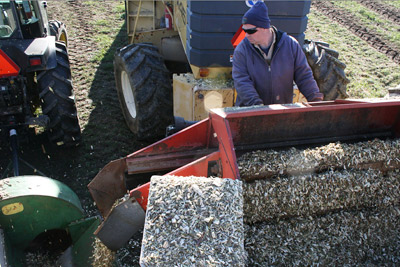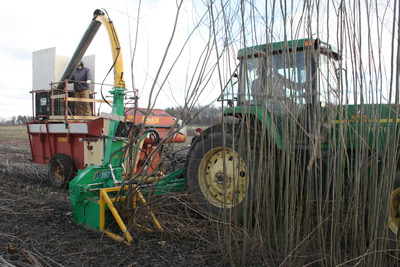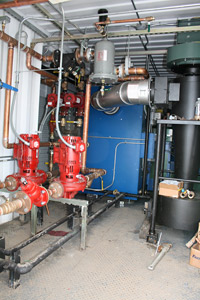Willow biofuels program ignites with new funding and boiler
By Amanda Garris

Prospects for meeting energy needs with a locally grown bioenergy crop are heating up on a Cornell campus.
Associate professor of horticulture Larry Smart's shrub willow bioenergy program is celebrating two milestones: a new $950,000 grant for breeding willow and installation of a boiler that will heat two buildings at Cornell's New York State Agricultural Experiment Station (NYSAES) in Geneva with willow biofuel produced right on campus.
"Willow is a renewable fuel option for people currently facing the high costs of heating with oil or propane," Smart said. "The scale of our demonstration plots and the new boiler would be appropriate for many businesses, municipalities, school districts, farms or non-farming landowners."

A recent land use assessment for the Northeast estimated that there are more than 6.9 million acres of idle or surplus agricultural land that is suitable for perennial bioenergy crop cultivation, without displacing acreage needed for food or feed production.
According to Smart, shrub willow has many advantages for filling those acres. Able to thrive on marginal, poorly drained land not suitable for other crops, shrub willows are also long-lived and nearly self-sufficient once established.

"Stands can be reharvested every two to three years for more than 25 winters without replanting," added Smart. "After the initial 18 months, they need essentially no herbicide or pesticide applications and require only a small amount of fertilizer -- much less than corn, which is currently the source for most of the bio-ethanol used to fuel cars."
Smart aims to breed new, improved willow cultivars that are better able to withstand pests and environmental stresses, have higher yields and a chemical composition tweaked to maximize ethanol production.
"Integrating the data from a concurrent willow genome sequencing project supported by the U.S. Department of Energy will allow us to develop a new, genomics-based breeding strategy that will also speed selection and cultivar development," he said.
The new $950,000 funding from the Northeast Sun Grant Institute will bolster his efforts.
"Dr. Smart's research is important for evolving the bio-economy of central New York," said Larry Walker, director of the Northeast Sun Grant Institute of Excellence and professor of biological and environmental engineering. "The willow program is exactly the type of integrated farm-to-furnace approach that the leadership of the Northeast Sun Grant Initiative envisioned for the Northeast."
"Our Northeast Sun Grant partnership with Penn State, SUNY-ESF [State University of New York College of Environmental Science and Forestry], Michigan State and West Virginia will provide a robust network to evaluate our new cultivars in marginal sites across the Northeast," Smart said.
He is putting willow biofuel to the test in a 750,000 Btu biomass boiler recently installed on the NYSAES campus with funding from a $405,000 grant from the New York State Energy Research and Development Authority. The boiler will be fueled by wood chips harvested every two years from some 20 acres of willow growing on Cornell farms, at a fraction of the cost of fossil fuels.
The willow biofuel plots were planted by project collaborator Double A Willow of Fredonia, N.Y., with funding from the New York Farm Viability Institute (NYFVI), a farmer-led nonprofit group that supports projects that are models for profitable innovations in farming.
"The NYFVI board of directors see energy crops as important options for New York farmers as a potential cash crop, as well as an energy source for their own use," said NYFVI managing director Dave Grusenmeyer. "This project will demonstrate the practicality and work the bugs out of a farm scale energy production system that will hold valuable potential for cost savings on New York farms."
Amanda Garris is a freelance writer in Geneva, N.Y.
Media Contact
Get Cornell news delivered right to your inbox.
Subscribe